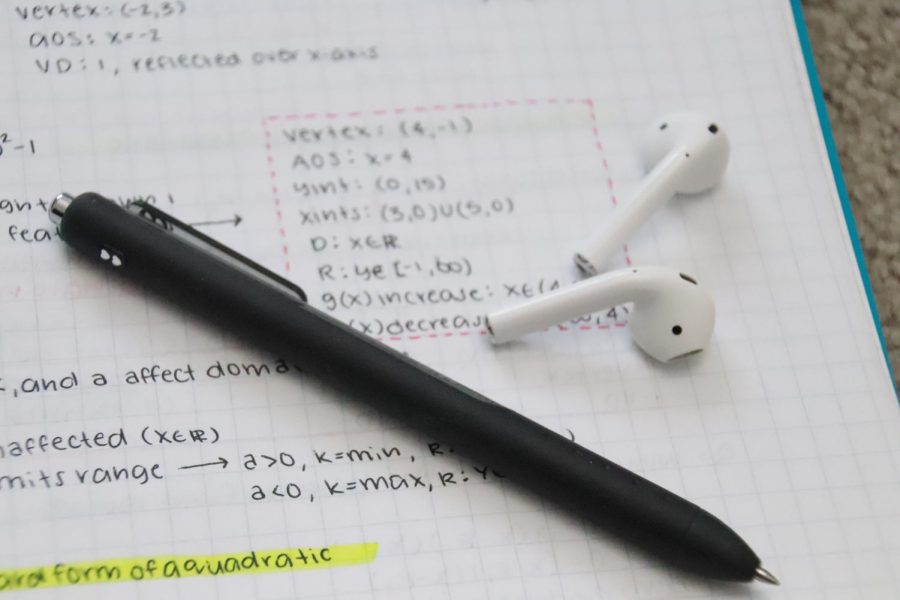Music and the Art of Being Productive
March 3, 2020
In the 21st century, music is widely accessible almost anytime, anywhere, and high schoolers most definitely use this opportunity to the fullest. Walking down the hallways, the number of students sporting headphones and earbuds is prominent. Music is certainly helpful for de-stressing between classes, but when it comes to learning and studying class content, the question regarding if music is more helpful or harmful receives a shaky answer. Music has been and always will be an essential part of life to many people, but different genres and volumes of music can influence the mind in unexpected ways. It is best for students to know how and what types of music can help or hurt before they incorporate it into their study sessions.
Unfortunately, the answer to the dying question, “Can music harm the studying abilities of students?” is horribly vague. According to Inquiries Journal, multiple studies prove that silence is the best atmosphere to study in, but for students who are unproductive in and unnerved by silence, music can assist them in different ways.
One such manner is by creating a positive atmosphere. According to Study International, the Mood Hypothesis confirms that music can improve people’s moods through the release of dopamine and that students are better at problem-solving and learning when they are in a positive mood. This goes hand in hand with the theory that music can reduce stress and anxiety, allowing students to overcome mental barriers that could negatively impact their learning. The Mood Hypothesis is a concept that many students attribute to music without even noticing it. Admitting to not giving the idea much thought, sophomore Madeleine Richardson said, in her case, “It’s definitely for the mood. Listening to music while studying makes it less sad.” Overall, the Mood Hypothesis acknowledges that music can help students endure long study sessions, though at the cost of being less productive during that time.
According to Focus@Will, another way music can assist in studying is by taking advantage of the brain’s reaction to stimuli. Music, like other forms of stimuli, stimulates a portion in the brain called the locus coeruleus, but humans receive a massive amount of stimuli daily and it would drop our attention spans and render us completely useless if we felt all of it directly. Instead, our brains use selective and executive attention to ignore consistent forms of stimuli, delegate primary tasks and focus on them. Although these brain functions may appear easier to manage in a low-stimulus environment, the opposite holds true. By overloading the decision-making parts of the brain, people can experience habituation, which allows the brain to adapt to constant stimuli like background noise and strengthen their executive attention. This is why many people find it easier to work in busy areas like cafes than in complete silence.
Unknowingly using music to force her brain into environmental habituation, senior Emma Swanson said, “I don’t listen to music while studying unless I’m trying to drown out other, more distracting noises.” The consistency of music offers significantly more benefits than sporadic, unpredictable background noises.
Habituation has two problems, though. One problem is that habituating to audio negates any of the audio’s soothing abilities, destroying the benefits of the Mood Hypothesis. Also, environmental habituation can lead to goal habituation, when one’s original goal becomes mundane and the brain invites distraction by searching for more interesting stimuli to focus on. This is how students end up from their math homework to social media the minute their phone chimes.
Essentially, the most helpful way for students to apply habituation to studying is by occupying their brains enough to activate their executive attention, but feeding it interesting stimuli at the right times to prevent goal habituation. Music accomplishes this task effortlessly with calming, consistent music that is familiar—no new songs—but without strong emotional or sentimental attachment, like songs with connected memories.
Generally, low-volume, calming, familiar, non-lyrical music is the best bet for reaping the benefits of listening to music while studying, but this still depends on what students wish to bring to their studying sessions. If they are keen on using the Mood Hypothesis to bring enjoyment and longevity to their study sessions, then they should be listening to music that they prefer and would listen to for pleasure. For people who are not classical music fans, Mozart is not going to help.
Unfortunately, answers discovered by scientific studies and hypotheses are still shaky. The presence of neurological or mental disorders can significantly influence the way music is perceived by an individual. Richardson, who has ADHD, said, “It one hundred percent affects how I listen to music. When I listen to music while studying, it can go both ways. I can either get completely distracted by the music or completely focused on my homework and not be able to hear the music at all.”
The effect music has on the mind differs widely from person to person. There are many students who find listening to music while studying distracting, like junior Abby Zehnpfennig, who needs complete silence and her phone out of the room in order to concentrate, and freshman Lucas Arteche, who said, “I listen to music a lot, like while playing soccer, but not while studying. I’d get off-track easily.” However, even among students who find music beneficial to their work, there is a disparity in how they apply it, like Swanson, who only listens to music in special circumstances and Richardson, who confesses to playing music extremely loud while studying in order to make it more enjoyable.
The effect of music on the brain is a complex, confusing science that has yet to be fully and concretely discovered, and its benefits to learning are obscure. In the end, it is encouraged that students discover and use the study habitats and techniques that are best for their own neurological functions. Whether their strategy is to listen to music before studying, playing their favorite songs all the way through, or studying in complete silence, all are valid ways to improve one’s concentration and efficiency.




